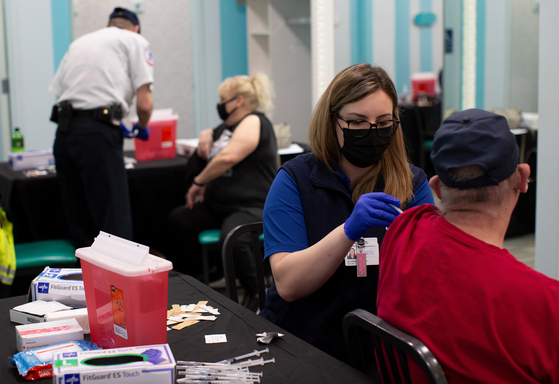
Medical staff are vaccinating at a temporary inoculation center installed in a shopping mall in Massachusetts, USA. EPA=Yonhap News
The Wall Street Journal (WSJ), a daily newspaper in the United States, reported that South Korea and other Asian countries pointed out that vaccination for the novel coronavirus infection (Corona 19) is slow, and may fall into an economic trap in the future.
WSJ reported on the 24th (local time) with an article titled “Asia, where vaccination is slow, is wasting opportunities for economic recovery”.
According to data from the international statistical website’Our World in Data’ cited by WSJ, 38 vaccines per 100 people were distributed in the United States, and 13 doses were distributed in the European Union (EU) on the same basis.
In comparison, the figures for Asian countries were low. In China, less than 6 vaccines were distributed per 100 people, and in Korea, Japan and Australia, less than 2 vaccines were distributed per 100 people.
WSJ said, “The slow vaccination rate in many regions in Asia and the Pacific will mean social distancing and travel bans until the second half of this year or even after that.” The observation that consumers will suffer a shortage of demand seemed to be vague, but it is no longer so,” he pointed out.
In particular, WSJ cited Korea as “a case that shows the future economic difficulties.”
WSJ said, “Korea’s real gross domestic product (GDP) declined by about 1.2% between the end of 2019 and the end of last year, due to a 1.2% increase in exports of goods and services by companies.” It is worse than the US (3.4%).”
WSJ also predicted that the economic costs of slowing the vaccination rate will not be small compared to the United States. WSJ predicted, “The Federal Reserve Board (FRB) is in a position to keep short-term interest rates low even if there is temporary inflation, but it will not continue.”
“Vaccination was a less urgent problem in developed countries in Asia, but as the years go by, they may become envious of Western countries (which introduced the vaccine sooner), he added.
Reporter Na Unchae [email protected]
![]()
